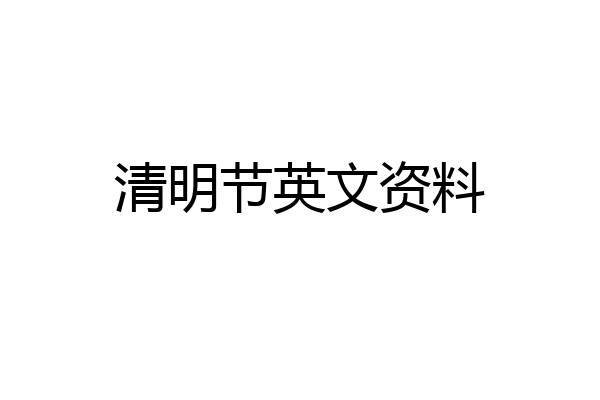
MindTheGapPlz
清明祭祖(worshiping ancestors)的传统可以追溯到古代,唐朝朝廷专门在此期间设定“节假日”以供子民祭祀先祖,该传统不断延续,在现代社会也有着举足轻重的影响。Cleaning the tombs and paying respect to the dead with offerings are the two important practices to remember late relatives. Weeds around the tomb are cleared away and fresh soil is added to show care for the dead. The dead person's favorite food, wine and chopsticks are offered on their tombs, along with paper money.扫墓和献上供品对逝者表示敬意,是两种纪念逝去亲友的重要习俗。为表示对逝者的关怀,墓边的杂草被清除并盖上新鲜的土壤。逝者最喜欢的食物、酒和筷子连同纸钱一起被供奉在墓边。


进击的银酱
Qingming Festival The Qingming (Pure Brightness) Festival is one of the 24 seasonal division points in China, falling on April 4-6 each year. After the festival, the temperature will rise up and rainfall increases. It is the high time for spring plowing and t to guide farm work, it is more a festival of commemoration. The Qingming Festival sees a combination of sadness and happiness. hahaThis is the most important day of sacrifice. Both the Han and minority ethnic groups at this time offer sacrifices to their ancestors and sweep the tombs of the diseased. Also, they will not cook on this day and only cold food is served. The Hanshi (Cold Food) Festival was usually one day before the Qingming Festival. As our ancestors often extended the day to the Qingming, they were later combined. On each Qingming Festival, all cemeteries are crowded with people who came to sweep tombs and offer sacrifices. Traffic on the way to the cemeteries becomes extremely jammed. The customs have been greatly simplified today. After slightly sweeping the tombs, people offer food, flowers and favorites of the dead, then burn incense and paper money and bow before the memorial tablet. In contrast to the sadness of the tomb sweepers, people also enjoy hope of Spring on this day. The Qingming Festival is a time when the sun shines brightly, the trees and grass become green and nature is again lively. Since ancient times, people have followed the custom of Spring outings. At this time tourists are everywhere. People love to fly kites during the Qingming Festival. Kite flying is actually not limited to the Qingming Festival. Its uniqueness lies in that people fly kites not during the day, but also at night. A string of little lanterns tied onto the kite or the thread look like shining stars, and therefore, are called "god's lanterns." The Qingming Festival is also a time to plant trees, for the survival rate of saplings is high and trees grow fast later. In the past, the Qingming Festival was called "Arbor Day". But since 1979, "Arbor Day" was settled as March 12 according to the Gregorian calendar.

乘风秋夜
Tomb-sweeping day, a traditional Chinese festival, falls at the turn of mid-spring and late spring.
(清明节,中国传统节日,又称踏青节、行清节等,节期在仲春与暮春之交。)
Tomb-sweeping day originated from ancestral beliefs and Spring Festival customs in ancient times.
(清明节源自上古时代的祖先信仰与春祭礼俗,兼具自然与人文两大内涵。)
It is both a natural solar term and a traditional festival.
(既是自然节气点,也是传统节日。)
Tomb-sweeping day is a big traditional Spring Festival.
(清明节是传统的重大春祭节日。)
It is a fine tradition of the Chinese nation since ancient times.
(是中华民族自古以来的优良传统。)
扩展资料
清明节习俗:
1、踏青
中华民族自古就有清明踏青的习俗。踏青古时叫探春、寻春等,即为春日郊游,也称“踏春”。一般指初春时到郊外散步游玩。
2、植树
清明前后,春阳照临,春雨飞洒,种植树苗成活率高,成长快。因此,就有清明植树的习惯,有人还把清明节叫作“植树节”。植树风俗一直流传至今。清明节植树的习俗,据说发端于清明戴柳插柳的风俗。
参考资料来源:百度百科-清明节

cathyzhou214
Qingming Festival, also known as the outing Festival, Xingqing Festival, March Festival and ancestor worship Festival, is held at the intersection of mid spring and late spring. Qingming Festival originated from the ancient ancestor belief and spring festival rituals and customs. It has both natural and human connotations. It is not only a natural solar term, but also a traditional festival.清明节,又称踏青节、行清节、三月节、祭祖节等,节期在仲春与暮春之交。清明节源自上古时代的祖先信仰与春祭礼俗,兼具自然与人文两大内涵,既是自然节气点,也是传统节日。词汇清明节Tomb Sweeping Day踏青go for a walk in the country in spring; have an outing in spring三月March; the third month of the lunar year; the third moon祭祖offer sacrifices to ancestors仲春second month of spring; the middle of spring暮春late spring上古palaeoid; ancient times; remote ages礼俗etiquette and custom节气a day marking one of the 24 divisions of the solar year in the traditional Chinese calendar; solar terms传统节日traditional festival; traditional holidays; Traditional Festivals

与食俱进a
The Qingming Festival, also known as the "Ta Qing Festival", "Xing Qing Festival", "March Festival" and "Sacrifice to the Ancestors", is a grand traditional festival of Spring Festival of the Chinese nation. It belongs to a traditional cultural festival of cautious pursuit.
respecting the ancestors and promoting filial piety. There are many customs in Qingming Festival. There are differences in contents or details of Customs in different regions and cultures.
Although customs vary from place to place, tomb sweeping and ancestor sacrifice and outing in Qingming are the common basic themes of customs.
Qingming Festival is one of the 24 special festivals in the ancient Ganzhi Calendar, which expresses the seasonal changes. It is in the period of vigor and vitality, and it is also the period of Yin and Qi recession.
At this time, everything is clean and new, and the Earth presents the image of spring and bright. Qingming Festival integrates solar terms and folklore, which is the unity of the time, the place and the people.
The etiquette and custom culture of the Qing and Ming Dynasties fully embodies the Chinese ancestors'thought of pursuing the harmony and unity of heaven, earth and man, paying attention to adapting to the times and the earth and following the natural law.
清明节又称踏青节、行清节、三月节、祭祖节等,是中华民族传统的隆重盛大的春祭节日,属于慎终追远、礼敬祖先、弘扬孝道的一种文化传统节日。清明节习俗甚多,全国各地因地域文化不同而又存在着习俗内容上或细节上的差异,各地习俗虽不尽相同,但扫墓祭祖、踏青郊游是共同基本礼俗主题。
清明节气是上古干支历法中表示季节变迁的廿四个特定节令之一,处在生气旺盛的时节,也是阴气衰退的时节。这一时节吐故纳新、万物皆洁齐,大地呈现春和景明之象。清明节将节气与民俗融为一体,是天时地利人和的合一。清明礼俗文化充分体现了中华民族先祖追求“天、地、人”的和谐合一,讲究顺应天时地宜、遵循自然规律的思想。

内涵帝在此
Qingming Jisao tomb is and Funeral Customs the Customs section. It contains the ancient "tomb without grave", that is only playing the pit, do not build Fenqiu, so Jisao not seen as set membership. Later the tomb and the grave, Jisao have the backing of the Popular. Han era, Muji has become an indispensable customs activities. "Han. Yan Nian Biography" contains, YAN even thousands of miles have left Beijing in the Ching Ming "is also owned by the East China Sea to grave" . on China

热腾腾的鱼粥
Qingming Festival originated from ancestor belief and spring sacrifice custom in ancient times. It has two connotations of nature and humanity. It is not only a natural solar point, but also a traditional festival.
清明节源自上古时代的祖先信仰与春祭礼俗,兼具自然与人文两大内涵,既是自然节气点,也是传统节日。
Qingming Festival is a traditional major spring festival. Tomb-sweeping and ancestor-remembering is a fine tradition of the Chinese nation since ancient times.
清明节是传统的重大春祭节日,扫墓祭祀、缅怀祖先,是中华民族自古以来的优良传统。
清明节,是中华民族最隆重盛大的祭祖大节,属于礼敬祖先、慎终追远的一种文化传统节日。清明节凝聚着民族精神,传承了中华文明的祭祀文化,抒发人们尊祖敬宗、继志述事的道德情怀。扫墓,即为“墓祭”,谓之对祖先的“思时之敬”,春秋二祭,古已有之。
清明节历史悠久,源自上古时代的祖先信仰与春祭礼俗。据现代人类学、考古学的研究成果,人类最原始的两种信仰,一是天地信仰,二是祖先信仰。上古干支历法的制定为节日形成提供了前决条件,祖先信仰与祭祀文化是清明祭祖礼俗形成的重要因素。
据考古发掘,广东英德青塘遗址发现了万年前的墓葬,是中国年代最早的可确认葬式的墓葬,表明上古先民在万年前已具有明确的有意识墓葬行为与礼俗观念。“墓祭”礼俗有着久远的历史源头,清明“墓祭”是传统春季节俗的综合与升华。
清明节俗丰富,归纳起来是两大节令传统:
一是礼敬祖先,慎终追远;
二是踏青郊游、亲近自然。
清明节不仅有祭扫、缅怀、追思的主题,也有踏青郊游、愉悦身心的主题,“天人合一”传统理念在清明节中得到了生动体现。经历史发展,清明节在唐宋时期融汇了寒食节与上巳节的习俗,杂糅了多地多种民俗为一体,具有极为丰富的文化内涵。
参考资料来源:百度百科-清明节